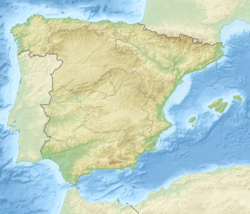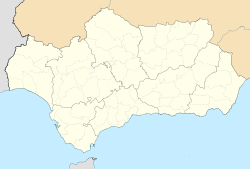Málaga
Málaga | |
|---|---|
 Top:Malagueta Bullring Stadium, Night view of Malaga Port, Stature of Cenachero, Patio de los Naranjos (inside the Alcazaba of Malaga), Second:Alcazaba of Malaga, Third:La Concepcion Botanical Garden (Jardin Botanico de La Concepcion), Calle Marqués de Larios, Malaga Cathedral, Fourth:Cervantes Theater (Teatro de Cervantes), Atarazanas Market (Mercado de Atarazanas), Panoramic view of Malaga Bay, from Sierra de Mijas, Bottom:Malaga Pompidou Center Centro Pompidou de Malaga, La Caleta Beach (Playa de la Caleta), Malaga Picasso Museum (all item of left to right) | |
 Flag  Coat of arms | |
 Málaga Location in Spain | |
| Coordinates: 36°43′10″N 4°25′12″W / 36.71944°N 4.42000°WCoordinates: 36°43′10″N 4°25′12″W / 36.71944°N 4.42000°W | |
| Country | Spain |
| Autonomous community | Andalusia |
| Province | Province of Málaga |
| Founded | 8th century BC[1] |
| Government | |
| • Type | Ayuntamiento |
| • Body | City Council of Málaga |
| • Mayor | Francisco de la Torre Prados (PP) |
| Area | |
| • Municipality | 398 km2 (154 sq mi) |
| • Urban | 827 km2 (319 sq mi) |
| Elevation | 11 m (36 ft) |
| Population (2018)[2] | |
| • Municipality | 571,026 |
| • Rank | 6th |
| • Density | 1,400/km2 (3,700/sq mi) |
| • Urban | 967,250[3] |
| Time zone | UTC+1 (CET) |
| • Summer (DST) | UTC+2 (CEST) |
| Postcode | 29001-29018 |
| Calling code | +34 (Spain) 95 (Málaga) |
| Website | www |
Málaga (/ˈmæləɡə/, Spanish: [ˈmalaɣa]) is a municipality of Spain, capital of the Province of Málaga, in the autonomous community of Andalusia. With a population of 578,460 in 2020,[4] it is the second-most populous city in Andalusia after Seville and the sixth most populous in Spain. It lies on the Costa del Sol (Coast of the Sun) of the Mediterranean, about 100 kilometres (62.14 miles) east of the Strait of Gibraltar and about 130 km (80.78 mi) north of Africa.
Málaga's history spans about 2,800 years, making it one of the oldest cities in Europe and one of the oldest continuously inhabited cities in the world. According to most scholars, it was founded about 770 BC by the Phoenicians as Malaka[5] (Punic:


